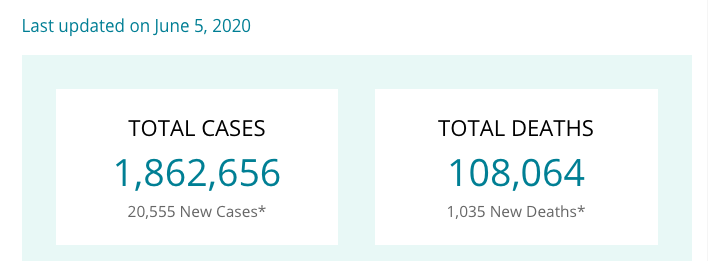According to the CDC, nationally, levels of influenza-like illness (ILI) and COVID-19-like illness (CLI) and the percentage of specimens testing positive for SARS-CoV-2, the virus that causes COVID-19, continue to decline or remain stable at low levels.
Mortality attributed to COVID-19 also decreased compared to last week but remains elevated above baseline and may increase as additional death certificates are processed.
The overall cumulative COVID-19 hospitalization rate is 82.0 per 100,000, with the highest rates in people aged 65 years and older (254.7 per 100,000) and 50-64 years (126.2 per 100,000).
Based on death certificate data, the percentage of deaths attributed to pneumonia, influenza or COVID-19 (PIC) decreased from 13.7% during week 21 to 8.4% during week 22 but remained above baseline. This is the sixth week of a declining percentage of deaths due to PIC, but this percentage may change as more death certificates are processed, particularly for recent weeks.
As far as treatments:
Hydroxychloroquine and chloroquine have been shown to kill the COVID-19 virus in the laboratory dish. The drugs appear to work through two mechanisms. First, they make it harder for the virus to attach itself to the cell, inhibiting the virus from entering the cell and multiplying within it. Second, if the virus does manage to get inside the cell, the drugs kill it before it can multiply.
Azithromycin is never used for viral infections. However, this antibiotic does have some anti-inflammatory action. There has been speculation, though never proven, that azithromycin may help to dampen an overactive immune response to the COVID-19 infection.
The jury is still out regarding whether these drugs, alone or in combination, can treat COVID-19 viral infection. While recent human studies suggest no benefit and possibly a higher risk of death due to lethal heart rhythm abnormalities, two studies supporting these conclusions have been retracted by the authors because of irregularities in how results were collected and analyzed.
Regarding the effectiveness of hydroxychloroquine alone to prevent coronavirus infection, the results of a clinical trial just published in the New England Journal of Medicine found that it did not prevent infection. However, how this study was conducted has been questioned by some experts.
Read more resources at: https://www.cdc.gov/














